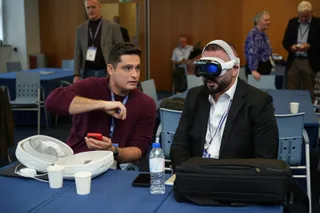Editor Discusses Education Standards
Contact Our Team
For more information about how Halldale can add value to your marketing and promotional campaigns or to discuss event exhibitor and sponsorship opportunities, contact our team to find out more
The Americas -
holly.foster@halldale.com
Rest of World -
jeremy@halldale.com
Do we have a system of healthcare or do we have many systems with many players all trying to play the game, with few playing by the same set of rules? In fact, many players don’t understand that each of the disparate players in the game have a set of rules that they must use regardless of the rules the other players are using. Each player has a set of standards that he or she must use and may or may not be aware that the other players are using different standards.
There are few international healthcare rules or standards that are recognized by all players. That is why a doctor from Africa may observe a surgical procedure done in the United States or Europe but can only perform the procedure in a few locations other than Africa. For that matter, a doctor in Oregon may perform a procedure in Oregon and not be allowed to perform the same procedure in Ohio.
How do you tackle the problem of developing a level playing field so all can participate, all are playing by the same set of rules and standards and that each of the players is equally qualified to play in his or her field?
More thought needs to be given to standardizing education of healthcare providers worldwide to combat the shortage that we are now facing. In the United States the Department of Labor has re-opened admission of qualified nurses to the US due to our shortage. Thought needs to be given to the standardization of licensure and credentialing across states and international borders, not just for nurses but for all healthcare providers.
If other medical schools are like those in the US when you have seen one medical school you have seen one medical school. This is not to say that the AAMC has not set criteria that all medical schools must meet, or the ACGME does not have rules and regulations that must be met or that residency boards don’t have criteria that must be followed. It is to say that an effort must be made to communicate the same guiding principles across the community . It is to say that something other than written tests need to be used to ensure that all participants are competent to perform the task required.
When you look up the World Health Organization site and you look at the A to Z list of studies, groups and projects, there is nothing on standards and the following on education, “Course of study required to educate a legally qualified and licensed practitioner of medicine, concerned with maintaining or restoring human health through the study, diagnosis and treatment of disease and injury, through the science of medicine and the applied practice of that science.” What safeguards are in place to insure that the practitioner is competent?
Medical schools are requiring students to learn more and more information. Jon Coleman, a medical student, in an article on February 23rd in Education wrote the following:“How do you ask a person to be the last person to go through an education system that is failing them?” Yet we’re doing just that. This is not to say that we are not producing good doctors. On the contrary, our doctors are likely the most well-educated and knowledgeable in history; but this is part of the problem. Every year the amount of information medical students are required to know increases. We do not replace information with better, more relevant information, we simply add more. . . . For decades we defined physicians by the amount of knowledge they accumulated, knowledge that separated the physician from lay persons. The mentality of the status quo will not suffice for the next generation of physicians. After all, patients are already doing their part, coming to see their physicians with Internet printouts, 23andMe results, etc. Now it’s time for physicians and medical students to do ours.” very sage advice from a digital native medical student.
When we make these changes to the curricula, the rules and regulations, should we not also be looking at how they would work globally? After all, there will be a worldwide shortage of qualified healthcare personnel very shortly if it does not already exist.


